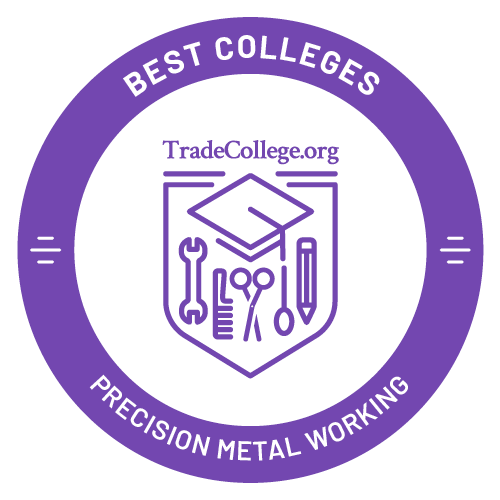Find Trade Colleges
2023 Best Precision Metal Working Undergraduate Certificate Trade Schools in Connecticut
Finding the Best Precision Metal Working Undergraduate Certificate School for You
In 2021-2022, precision metal working students earned 426 degrees and certificates from a Connecticut school, making the subject the 7th in the state.
There are so many trade school programs in today's world that it can tough to figure out which one is the right one for you. You're no longer limited to schools in your local area, either, since online programs are becoming more prevalent. Or you may find the programs at a trade school to be a better alternative for you.
Along with in-depth profiles of schools and the programs they offer, Trade College Search has created the Best Precision Metal Working Undergraduate Certificate Trade Schools in Connecticut to help you in your search for the best school for you. This report analyzed 3 schools in Connecticut to see which ones offered the best undergraduate certificate programs for trade school students.
View our full ranking methodology.
Featured schools near , edit
2023 Best Precision Metal Working Undergraduate Certificate Schools in Connecticut
The following schools top our list of the Best Precision Metal Working Undergraduate Certificate Colleges.
Top Connecticut Trade Schools for an Award Taking 1 to 4 Years in Precision Metal Working
Our analysis found Asnuntuck Community College to be the best school for precision metal working students who want to pursue a undergraduate certificate in Connecticut. Located in the large suburb of Enfield, ACC is a public school with a small student population.
The average amount in student loans that precision metal working majors at ACC take out while working on their Undergraduate Certificate is $5,459.
You’ll be in good company if you decide to attend Lincoln Technical Institute - East Windsor. It ranked #2 on our 2023 Best Precision Metal Working Undergraduate Certificate Trade Schools in Connecticut list. Located in the rural area of East Windsor, Lincoln Tech - East Windsor is a private for-profit college with a small student population.
On average, precision metal working graduates from Lincoln Tech - East Windsor take out $10,038 in student loans while working on their Undergraduate Certificate. When it comes time to repay the loan, graduates who are on a 10-year repayment plan pay an average monthly payment of $157.
Read full report on Precision Metal Working at Lincoln Technical Institute - East Windsor
The excellent undergraduate certificate programs at Naugatuck Valley Community College helped the school earn the #3 place on this year’s ranking of the best precision metal working schools in Connecticut. Located in the medium-sized suburb of Waterbury, Naugatuck Valley Community College is a public college with a small student population.
Full Precision Metal Working at Naugatuck Valley Community College Report
Best Precision Metal Working Colleges in the New England Region
Explore all the Best Precision Metal Working Colleges in the New England Area or other specific states within that region.
| State | Degrees Awarded |
|---|---|
| Massachusetts | 23 |
| Maine | 104 |
| Rhode Island | 26 |
| New Hampshire | 119 |
| Vermont | 65 |
Rankings in Majors Related to Precision Metal Working
Precision Metal Working is one of 5 different types of trade school programs to choose from.
Precision Metal Working Concentrations
| Major | Annual Graduates |
|---|---|
| Welding Technology/Welder | 46,029 |
| Machine Tool Technology/Machinist | 3,181 |
| Computer Numerically Controlled (CNC) Machinist Technology/CNC Machinist | 2,275 |
| Machine Shop Technology/Assistant | 1,588 |
| Tool & Die Technology/Technician | 541 |
| Metal Fabricator | 413 |
| Sheet Metal Technology/Sheetworking | 319 |
| Ironworking/Ironworker | 226 |
| Other Precision Metal Working | 218 |
Majors Similar to Precision Metal Working
| Related Major | Annual Graduates |
|---|---|
| Woodworking | 435 |
| Other Precision Production | 67 |
| Leatherworking & Upholstery | 46 |
| Precision Production Trades | 44 |
| Boilermaking | 29 |
Notes and References
*These averages are for the top 3 schools only.
- Read more about our ranking methodology.
- The Integrated Postsecondary Education Data System (IPEDS) from the National Center for Education Statistics (NCES), a branch of the U.S. Department of Education (DOE) serves as the core of the rest of our data about colleges.
- Some other college data, including much of the graduate earnings data, comes from the U.S. Department of Education’s (College Scorecard).
More about our data sources and methodologies.


